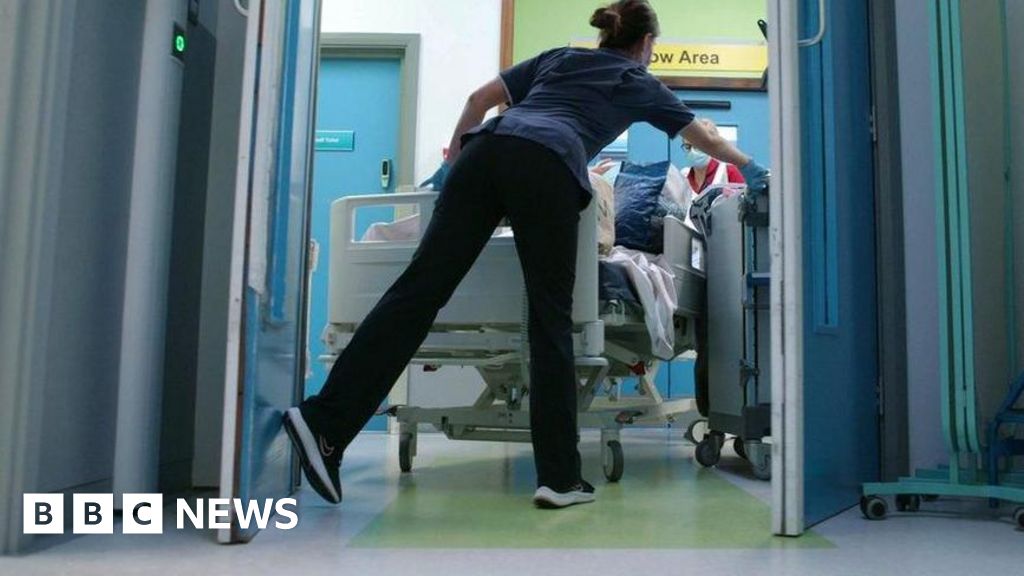ARTICLE AD BOX

Former head teacher Frances Akinde said Isaac's death could have been prevented if his family had more support
A former head teacher has spoken out after an autistic student, whose family had been pleading for support, died.
Isaac Uzoegbu, 16, was hit by a car after he ran from his house into the road. His parents were struggling to manage as his behaviour became increasingly out of control.
He is the third autistic boy BBC News has identified to die in the Kent and Medway area over the past three years.
Medway Council said it had given prompt support to the family.
Isaac, who also had learning disabilities, died five days after the accident outside his house in Gillingham, Kent, just after Christmas two years ago.
The head teacher of his special needs school at the time, Frances Akinde, believes his death could have been prevented if his local authority, Medway Council, had put in extra behaviour support for him.
Experts have told BBC News that autistic children are far more likely to flee and put themselves in danger if they feel overwhelmed. Too often local authorities fail to recognise the risks and ways to manage a child's behaviour, they say.
Mrs Akinde contacted BBC News after reading about the dozens of autistic people who had died following serious failings in their care by their local health and social services across England and Wales.
Of the 51 we identified, we highlighted the deaths of two boys from the Kent and Medway area - Sammy Alban Stanley, 13, and 15-year-old Stefan Kluibenschadl - after the same coroner called for action to prevent future deaths.
The coroner said if children with complex needs were not given access to the care and treatment they needed, it was "predictable that a similar incident may arise". Mrs Akinde said the failings in Isaac's care resembled those in Sammy's death two years earlier.
She told the BBC: "I said to myself, if I stay quiet on this, I'm part of that system."
Sammy and Stefan died within two years of each other. Both were autistic, both went to the same school, both were under the care of NHS Kent and Medway and both experienced serious failings in their care.
Sammy died in April 2020, nearly two years before Isaac. He fell from a cliff near his house in Ramsgate.
His autism - combined with Prader-Willi Syndrome, which causes learning disabilities and behavioural challenges - meant he could often run away after becoming overwhelmed and would disassociate from the world around him. At these times, he would lose any understanding of danger. Sammy's mum had begged for more support.
Six months before Stefan's death, he began to really struggle with his mental health. Despite a referral from his GP, NHS Kent and Medway rejected his family's pleas for help.
The coroner ruled Stefan had died as a result of his own actions, but she said she could not be sure of his intention.
Isaac's family have given Mrs Akinde permission to tell Isaac's story on their behalf.
"He was just the most joyful young boy," recalls the former head teacher of Rivermead School in Gillingham. "Everyone remembers Isaac for his smile."
His behaviour began to change as he hit adolescence. Mrs Akinde says as he started to struggle socially, he became increasingly anxious, frightened and began to lash out.
Image source, Patricia Alban Stanley/Emma Kluibenschadl
Image caption,The coroner examining the deaths of Sammy Alban Stanley and Stefan Kluibenschadl warned of the risk of other fatalities
Isaac's behaviour began to escalate in early September 2021, and Mrs Akinde says the school was doing all it could to manage it. She says she was in regular contact with the local authority but, despite her pleas, little support came. Medway Council disputes this, saying it was not made aware of Isaac's issues until late November.
His family adapted their small, terraced home, by changing the living room into a bedroom and living area for Isaac - to give him more space and to try to prevent him from feeling so overwhelmed.
Mrs Akinde says the situation reached crisis point in early December, just a few weeks before the accident. A referral to the local authority had been made on 25 November and assessments were still taking place.
With the Christmas holidays approaching, Mrs Akinde and her team were worried how Isaac would cope without the structure and routine of school.
The school offered respite provision over the holiday to help Isaac and his family, which would have had to be paid for by Medway Council.
The former head teacher says this offer was turned down because it was not seen as financially viable.
The local authority told the family to lock the door every night in case he ran away, as his behaviour became more unpredictable and volatile.
Mrs Akinde says they felt they tried everything they could. "We had begged the local authority for help at school and at home, we checked in with the parents," she says.
But their worst fears materialised. On 28 December, his father, who was also caring for his three other children, fell asleep and didn't lock the door.
Isaac escaped barefoot and ran into the path of an oncoming car.
He died five days later after suffering major head injuries.
Holding a card from Isaac, in which he had drawn a big smiley face, Mrs Akinde says tearfully, "he shouldn't have died in this way".
Isaac sent this card to Mrs Akinde to thank her for helping him feel safe while he was at school
Dr Sarah Cassidy, an associate professor at the University of Nottingham who specialises in autism research, says between 30% and 50% of autistic children may flee an area when they are overwhelmed - which researchers call "elopement".
"As many as a third who elope experience severe or even fatal injuries," she says.
"There is a clear lack of understanding of autism in this case and it's something we see time and time again."
She says even ordering the family a magnetic lock so the front door was secured automatically might have made a difference.
- For details of organisations offering advice and support for issues relating to autism, visit BBC Action Line.
Mrs Akinde highlighted the lack of support for Isaac's family in a child death review - a process which takes place after any child dies in England and which should inform the coroner's investigations at the inquest.
BBC News has obtained an audio recording of Isaac's inquest. Neither the school or the local authority were asked to give evidence.
The coroner ruled that Isaac's death was due to a road traffic collision.
The BBC approached Kent and Medway Coroner Service for comment but it did not respond.
The accident that killed Isaac took place on the road where he lived in Gillingham, Kent
Medway Council told the BBC it had acted promptly to provide direct support to the family, and it arranged an emergency review about Isaac's future education after becoming aware of the former head teacher's concerns, adding it was "truly a tragic accident".
While Medway Council has responsibility for social services provision, NHS Kent and Medway oversaw Isaac's child death review.
Alison Cannon, Kent and Medway's chief nurse, said the loss of a child is traumatic and it took its statutory role very seriously, adding that it had "followed all national guidance and law".
Anne Longfield, the former children's commissioner, told BBC News that having so many different organisations involved in a child's care often means it is hard to find who was responsible after a tragedy.
She said: "No-one is clear enough whose job it is to keep these children safe."
Mrs Akinde says she was not only devastated by Isaac's death, but also by the lack of accountability afterwards.
She says: "I want Isaac to be an example of what happens when you don't care enough."

 1 year ago
27
1 year ago
27








 English (US) ·
English (US) ·